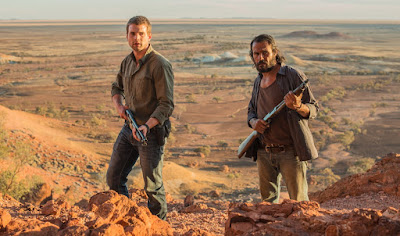The award-laden (in Australia, at least) Australian movie GOLDSTONE harks back to those American westerns (with a sizeable helping of film noir tropes added to the mix) in which an outsider appears in town to investigate what looks like a simple problem that soon opens up into an entire web of corruption and sleaze. So, yes, we've seen this before. (Bad Day at Black Rock, anyone?). The difference in Ivan Sen's movie resides in the compellingly bleak-but-beautiful outback vistas that amaze the eye, and in the two lead performances, especially that of Aaron Pedersen in the role of the mixed-race detective who comes to "town" (we use that word loosely) to investigate.
Mr. Pedersen (above), who was so frighteningly fine as one of the two crazy murderers in last year's best couple-in-jeopardy survival movie, Killing Ground, is even better here as the taciturn fellow who just wants to do his job. The actor is especially good at allowing us to imagine all that roils beneath his quiet-but-deep surface.
His co-star is the younger actor Alex Russell, above, who plays the town's one lone cop, a man in the process of slowly being corrupted by the powers-that-be -- both corporate and political --
played respectively by David Wenham (above, right) and Jacki Weaver (left, getting a piggy-back ride). Few actors do buttoned-down sleaze better than Mr. Wenham, while Ms Weaver is always a delight, especially when she is being sweetly vicious, as here (and in Animal Kingdom).
De rigueur these days is a nod to sex trafficking, here via a bevy of beautiful Asian girls like the one played by Michelle Lim Davidson, above), whom one of our heroes decides he must help.
Also often seen in Aussie films is that sub-plot about native Aboriginal lands being stolen by the sadly winning combination of corporate power and local politics. That surfaces here via two characters: an old man named Jimmy (David Gulpilil, above) who appears to be a kind if spiritual leader to the particular group of Aboriginals and another named Tommy, played by Tommy Lewis (aka Tom E. Lewis), shown below,
who has renounced his tribe to go to work for the opposite side. Both actors -- probably the most seen of all Aborigine performers -- hold a special place in Australian film. Lewis, who died earlier this year, made his movie debut in that classic (and still hugely powerful) The Chant of Jimmie Blacksmith (1978), while Gulpilil made his in Nicolas Roeg's famous Walkabout (1971). Both have worked steadily ever since, and their contribution to Goldstone, in terms of performances and the movie's underlying theme of the destruction of Aboriginal land and culture add to the undeniable gravity here.
Goldstone opens with a montage of archival photos showing, among other fascinating shots, Australia's use of slave labor via the Chinese and the Aboriginals. What follows brings all this up to date in a tale that offers its own depressing plus ça change effect.
For all its weight and slow-burn build to an exciting climax, the movie will seem to many older viewers not all that original. We've seen its like before, many times over.
And yet writer, director, editor, composer and cinematographer (whew!) Ivan Sen (shown at right) still manages to make most of it seem reasonably fresh and consistently compelling. He draws fine performances from his cast -- and a super one from Pedersen -- leaving us, once again and forever, it seems, watching the "haves" slowly, quietly and very effectively destroy the "have-nots."
From Lightyear Entertainment and running 110 minutes, the movie, after finding a limited theatrical release this past March, hits DVD this coming Tuesday, September 11, via MVD Entertainment -- for purchase and (I hope) rental.
Note to Lightyear and MVD: Please invest in the English subtitles options for any future release that sports thick Aussie accents. We missed probably one-quarter of the dialog, thanks to this omission.

















































